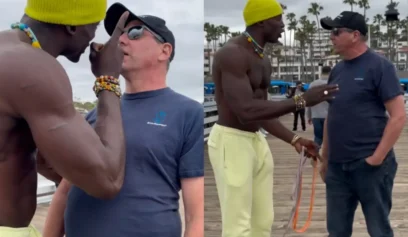France beefed up security at some of its embassies on Wednesday after a satirical Parisian weekly published crude caricatures of the Prophet Muhammad.
The developments come on the heels of last week’s outrage over the American-made anti-Muslim film that has sparked violence throughout the Middle East and resulted in the deaths of 28 people, including U.S. Ambassador to Libya, John Christopher Stevens.
Mindful that his country boasts the largest Muslim population in Western Europe, the French prime minister said he would block a demonstration by people angry over the depiction of Muhammad in the provocative movie. His decision has plunged the country into a fierce debate about free speech.
The government defended the right of magazine Charlie Hebdo to publish the cartoons, which played off of the U.S.-produced film “The Innocence of Muslims,” and riot police took up positions outside the offices of the magazine, which was firebombed last year after it released an edition that mocked radical Islam.
The French Foreign Ministry issued a travel warning Wednesday, urging French people in the Muslim world to exercise “the greatest vigilance,” avoiding all public gatherings and “sensitive buildings” such as those representing the West or religious sites.
Meanwhile, both government authorities and Muslim leaders urged calm in France.
“This is a disgraceful and hateful, useless and stupid provocation,” Dalil Boubakeur, rector of the Grand Paris Mosque, told The Associated Press. “We are not like animals of Pavlov to react at each insult.”
CFCM, an umbrella group for French Muslims, issued a statement that called on French Muslims to “not cede to provocation and … express their indignation in peace via legal means.”
Prime Minister Jean-Marc Ayrault said organizers of a demonstration planned for Saturday against “Innocence of Muslims” won’t receive police authorization.
“There’s no reason for us to let a conflict that doesn’t concern France come into our country,” Ayrault told French radio RTL.
The tensions surrounding the film are provoking debate about the limits of free speech.
The prime minister said freedom of expression is guaranteed in France, but cautioned that it “should be exercised with responsibility and respect.”
Foreign Minister Laurent Fabius defended freedom of expression, but warned that Charlie Hebdo could be throwing “oil on the fire” and said it’s up to courts to decide whether the magazine went too far.
Fabius said that because of the Charlie Hebdo caricatures, embassy security was being stepped up in some countries, and that he had “sent instructions to all countries where this could pose problems.”
Charlie Hebdo has courted potentially dangerous controversy in the past. Last November the magazine’s front-page, was subtitled “Sharia Hebdo,” a reference to Islamic law, and showed caricatures of radical Muslims. The newspaper’s offices were destroyed in a firebomb attack just hours before the edition hit newsstands.
In 2006, Charlie Hebdo printed reprints of caricatures carried by a Danish newspaper in 2005 that stoked anger across the Islamic world. Many European papers reprinted the drawings in the name of media freedom.
Charlie Hebdo has also faced legal challenges. The weekly was acquitted in 2008 by a Paris appeals court of “publicly abusing a group of people because of their religion” following a complaint by Muslim associations.


